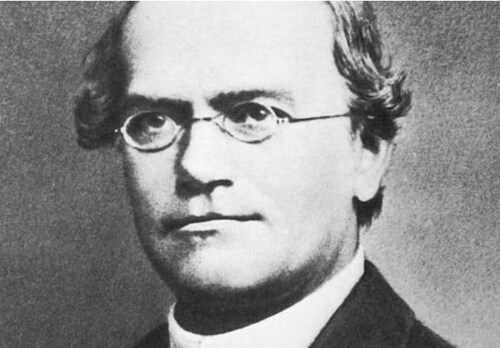

Founder Of Genetics Gregor Mendel
Gregor Johann Mendel (July 20, 1822 Hynčice – January 6, 1884 Brno) was a Czech biologist of German origin, (his father was from a quarter with Czech ancestors), founder of genetics and discoverer of the basic laws of heredity. He was a monk and later abbot of the Augustinian monastery in Staré Brno. (Brno is the second largest town in Czech Republic.)
Johann Mendel was born on July 20, 1822 in a family of German-speaking small farmers in Hynčice (Heinzendorf bei Odrau in German) in Silesia in house No. 58 (now No. 69) to Anton Mendel and mother Rosina née Schwirtlich. The mother was German, the father was half Czech.Today, Hynčice is part of the village of Vražné in the district of Nový Jičín in the Moravian-Silesian region. Mendel's birthplace was a relatively large farmstead, registered in 1966 as a cultural monument with the function of a museum.
After graduating from elementary school in Hynčice, he attended a Piarist school.
Between 1840 and 1843 he studied at the Faculty of Philosophy of the University of Olomouc. In 1843 he came to the Augustinian monastery of St. Tomáš in Staré Brno and took the religious name Gregor. In the priestly seminary at the church of St. Michael, J. G. Mendel graduated from theology studies and in the church of St. Michala was ceremoniously ordained a priest.
In the years 1856–1863 he devoted himself to cross-breeding peas and monitoring the offspring. Based on his experiments, he formulated three rules that later became known as Mendel's laws of inheritance.
He presented his experiments on plants in 1865 at a meeting of the Brno Natural Science Society and subsequently published the work "Experiments with plant hybrids" (1866) (German: Versuche über Pflanzen-Hybriden).

Mendel worked with seven characteristics of pea plants: plant height, pod shape and color, seed shape and color, and flower position and color. Taking seed color as an example, Mendel showed that when a true-breeding yellow pea and a true-breeding green pea were cross-bred their offspring always produced yellow seeds. However, in the next generation, the green peas reappeared at a ratio of 1 green to 3 yellow. To explain this phenomenon, Mendel coined the terms "recessive" and "dominant" in reference to certain traits.
Mendelian inheritance is a type of biological inheritance that follows the principles originally proposed by Gregor Mendel in 1865 and 1866, re-discovered in 1900 by Hugo de Vries and Carl Correns, and popularized by William Bateson.

Mess in Brno began the celebrations
The big celebrations of 200 years since the birth of Gregor Johann Mendel started already on Sunday 17th July. The festival dedicated to the prominent abbot and scientist will last a whole week.
The main point of the scientific program is the international genetics conference, part of which will take place in the monastery where Mendel lived. It will be attended by almost 400 experts from all over the world, including three Nobel Prize winners.

Last year, Masaryk University organized the exhumation of Mendel's body in cooperation with Brno and the Augustinian Order. “The remains were identified with a find in his favorite astrology book where his hair was found. We have preliminary results and are looking to see if Mendel was, for example, a carrier of a gene for some disease that is hereditary according to his laws. A large monograph on research will be published this year."
"For example, the end of Mendel's life, when he suffered from kidney disease, is relatively well mapped. He had massive swelling and signs of heart failure. What was prescribed for his medicine was also preserved. We also know that he suffered from major mood swings and psychological problems throughout his life," revealed Michael Doubek in an interview.

Giant green pea in front of Augustinian monastery in Brno
Scientific interest prevailed over the spiritual
"Mendel specifically wished to be autopsied after his death. The autopsy was performed at the then hospital at St. Anna, the records have been preserved - although not very extensive," says Professor Doubek.
Contemporary Czech and international scientists continue to build on Mendel´s work in new experiments.
All classical genetics is based on Mendel's work, where individual traits are monitored and how they are transmitted to offspring.
Mendel considered the variability of plants to be a proven fact. He was the first to make a significant revolution - he was the first not to evaluate the organism as a whole, but to break it down into individual signs. He understood individual signs (e.g. the shape of a ripe seed) as opposites, e.g. round on one side, square on the other - like two sides of the same coin.
.png)
Mendel's laws, which he first described, play a role and are significant in all of medicine today. Genetics is part of all medical fields. The vast majority of diseases (even those that we wouldn't recognize at first glance) have some genetic basis.
Thanks for reading
